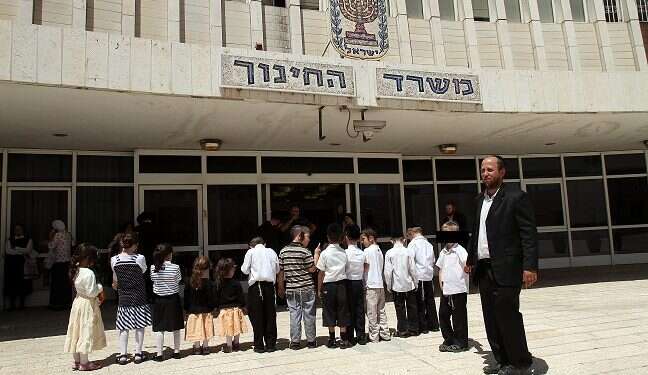A record number of first- to eighth-grade schoolchildren from the ultra-Orthodox sector will be starting the 2018-2019 school year at institutions that teach core curriculum subjects in addition to Torah study.
The number of pupils in haredi public schools for this year stands at approximately 6,000.
In 2014, the Education Ministry established a track for haredi public education, which in addition to intensive religious studies will include instruction in math, English, science, languages, and history.
Haredi public schools will be obligated to devote the same minimum number of hours to each core subject as secular or modern Orthodox public schools do. Education Ministry policies and programs, adjusted to meet the needs of the highly observant sector, will apply to all haredi public schools, which will also be subject to close ministry oversight to ensure that instructional criteria are met.
In 2014, the first year that haredi public education was made available, only 1,322 pupils were registered in these public schools. That number rose to 5,652 in the 2017-2018 school year.
Despite the dramatic uptick in the number of haredi families seeking core curriculum education for their children, they still comprise a small minority of the haredi population as a whole. Some 235,000 ultra-Orthodox children currently attend haredi institutions whose curricula do not include or devote less time to core subjects than Education Ministry regulations stipulate.
"When the haredi sector is approached with patience and openness to discussion, things work. The results speak for themselves," Education Minister Naftali Bennett said.
"More and more schools in the haredi sector are teaching the core curriculum – math, English, science, and more – along with Torah study. The haredi public is undergoing changes and wants to integrate into education and employment," he said.
"There's no reason why a pupil from Bnei Brak shouldn't discover his potential. The Israeli government should keep encouraging haredim to study core subjects and integrate with the general population while maintaining its unique characteristics. I'm happy that we are already seeing a welcome change, and we'll keep putting resources and effort into it. We'll continue to move the haredi public ahead and lead the way for high-quality, egalitarian education for every child in Israel."
The Jerusalem Municipality said that it has seen record demand for haredi public education. Five years ago, when the track was launched, only 138 pupils in the capital were registered for it, compared to the 2018-2019 school year, which has 643 haredi boys and 325 girls from first to 12th grade registered at four haredi public schools in the city. There is also a long waiting list.
"There is a lot of demand for these schools," an official in the Jerusalem Municipality, which has invested some 12 million shekels ($3.3 million) to get its haredi public school system off the ground, explained.
"At the girls' elementary school Banot Yerushalayim, two girls are waiting for every free spot. This has led to a situation where, if parents want their kid in [a haredi public] school, they need to sign them up as early as nursery school to ensure them a place for first grade," the official said.
"Moshe," whose daughter will be starting the third grade at a haredi public school, said that "today, girls have two options after seminary – teaching or graphic arts. I know that my daughter can do more and I want to give her the option to be anything – a scientist, a doctor, or a computer programmer. After studying in a school like this and earning a matriculation certificate like any other student in Israel, her future will look different," Moshe said.
Jerusalem Mayor Nir Barkat said, "The haredi public school track is a great success in Jerusalem, as a solution to many requests from parents. We're proud that these institutions are characterized by pedagogic innovation and religious study on a high level, along with all the other innovative programs that have been included in the school system as a whole."




